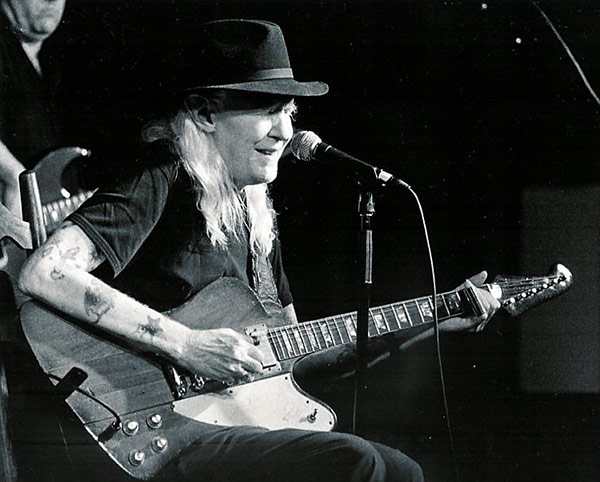Review by Ray Stiles
Thirty-two years after the release of his debut, self-titled album, Johnny Winter has reached almost iconic status in the world of blues and blues-rock. There is a mystique surrounding Winter. He has a striking appearance—he, like his younger brother Edgar, was born an albino, lacking pigmentation in his hair and eyes. With long, flowing, waxen white hair, he is also legally blind. Plagued by poor health throughout his childhood, his physical condition was further marred by years of drug and alcohol abuse, taking a toll on his already frail body. He is thin as a rail, can barely see, and needs assistance just to strap on his guitar. Watching him stand on stage, you might get the impression that the slightest breeze could knock him over. His body is covered in tattoos, although, surprisingly, he didn’t get his first tattoo until he was nearly 40. When asked about it, he said, “It was right before I was forty. I was looking for something new to do that wasn’t self-destructive. Tattoos turned out to be it.” While it might not be as harmful as drugs, I suppose it was still quite a bold choice. (And no, there’s no truth to the rumor that he got a new tattoo for every album he released.) Despite his frail appearance, it has always been Johnny Winter's guitar playing that sets him apart.
Born John Dawson Winter III in Beaumont, Texas, on 23 February 1944, Johnny and his brother Edgar grew up surrounded by blues, country, and Cajun music. Johnny began playing clarinet at age five, later switching to the ukulele and then the guitar when his hands were big enough. Both brothers showed an early inclination toward music, singing as a harmony duet fashioned after the Everly Brothers, winning talent contests, and appearing on local television shows. By age 14, Johnny had his own band, and a year later, he recorded the singles "School Day Blues" and "You Know I Love You" with Houston-based Dart Records, gaining local notoriety. At 16, he snuck into local clubs like Beaumont’s Black Raven Club, an all-Black venue where legends like Muddy Waters, Bobby Bland, Junior Parker, and B.B. King performed. He even sat in with B.B. King at one of those shows. Another frequent haunt was the Pleasure Pier Ballroom in Port Arthur, Texas, where Louisiana bluesmen like Lonnie Brooks and Lightnin’ Slim played.
Throughout the early and mid-60s, Johnny continued to play popular rock and roll, but he always returned to his true love, the blues. His big break as a solo artist came in 1967 after recording an album with Red Turner (drums) and Tommy Shannon (bass) for an obscure regional label (Sonobeat). Rolling Stone journalists Larry Sepulvado and John Burks heard the album and mentioned Johnny in an article they were writing about Texas music. They wrote, “Imagine a 130-pound, cross-eyed, albino bluesman with long fleecy hair playing some of the gutsiest blues guitar you have ever heard.” That little piece catapulted Winter from a local guitar hero to international stardom, earning him a major record label contract. In 1977, Winter also played a key role in producing and performing on Muddy Waters' Grammy-winning album Hard Again.
The First Avenue show was another in a series of comeback performances for Winter over the past three years. He is slowly regaining his strength and beginning to show the dynamic spark of his early blues guitar prowess. Hunched at the shoulders and keeping his eyes closed for much of the performance, Winter never stopped rocking back and forth as he played to a near sell-out crowd of adoring fans.
With his patented headless Lazer guitar strapped over his stooped shoulders, Winter began his set, as always, by paying homage to one of his biggest influences, Freddie King. The instrumentals "Hideaway" and "Sen-Sa-Shun" were followed by "She Likes to Boogie Real Low," "Just a Little Bit," Ray Charles’ smoldering ballad "Black Jack," and "Got My Mojo Working." With the help of his guitar tech, he switched to his famed sunburst Gibson Firebird to showcase his phenomenal slide guitar chops with a fiery rendition of "The Sun Is Shining." Influenced by slide guitar legends Robert Johnson and Son House, Winter plays with the slide on his little finger, coaxing sounds from his guitar that harken back to the heyday of delta blues. Interestingly, Winter uses a piece of conduit pipe for his slide. In an interview with Goldmine Magazine, he said, “It’s just a piece of pipe. I used test tubes, pieces of test tubes, pieces of pipe… but nothing worked right until I played in Denver. A guy from Denver named Morris Tiding turned me on to a piece of conduit pipe—a 12-foot piece we got from a plumbing supply place. And I’m still using that same piece of pipe. I just saw off another piece every time I need a new one.”
Most of Winter’s songs lasted between five to ten minutes, with little break or commentary between them. He maintained a brisk pace, and while his guitar playing might not have the “pyrotechnics” of other blues-rockers, his mastery of blues guitar nuances remains unparalleled. His playing epitomizes the finest elements of the Texas blues guitar tradition. For his encore, Winter returned to the stage and delivered a crushing rendition of his adopted theme song, "Johnny Guitar," made famous by Johnny “Guitar” Watson. He even threw in his trademark "twirl," performed almost in slow motion.
Johnny Winter, this soft-spoken, frail, tattooed Texas titan, remains one of blues-rock's seminal figures. He still has the ability to captivate an audience and mesmerize his fans. You can feel his sincerity and sense his almost childlike quality when he sings, “They call me Johnny Guitar. I'm comin' to play in your town."
